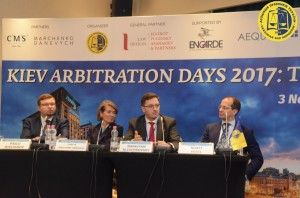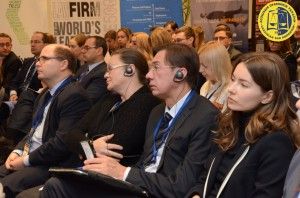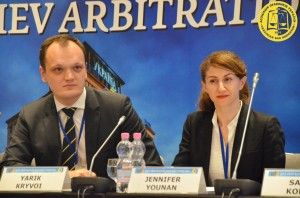Kiev Arbitration Days-2017: Think big! (conference report)
 On 3 November 2017 the Ukrainian capital – Kiev – hosted the International Conference “KIEV ARBITRATION DAYS 2017: Think Big!”, organized by the Ukrainian Bar Association. The CIS Arbitration Forum was the information partner of the event.
On 3 November 2017 the Ukrainian capital – Kiev – hosted the International Conference “KIEV ARBITRATION DAYS 2017: Think Big!”, organized by the Ukrainian Bar Association. The CIS Arbitration Forum was the information partner of the event.
The Kiev Arbitration Days 2017 aimed to bring together outstanding dispute resolution practitioners and leading arbitration experts to discuss problems of international arbitration and their potential solutions.
This year’s conference featured emergency arbitration, summary dismissals and expedited proceedings, cross-examination and evidence collection, alternative funding redux and other important issues, such as Brexit, US policy and prospects of Permanent Investment Court.
Welcome addresses
Irina Nazarova, the Conference programme coordinator, Managing Partner at ENGARDE Attorneys at Law with professionals (view full page) from https://criminaldefenselawfirmtampa.com/dui/, opened the conference and stressed upon the thorny path the arbitration community in Ukraine had to go through in order to create an attractive venue for arbitration net-working in Kiev. Oleksiy Filatov, Deputy Head of the Presidential Administration of Ukraine, while discussing the ongoing judicial reforms in Ukraine, addressed two main goals domestic courts should achieve in the context of international arbitration.
First, ‘the courts should interpret any doubts regarding the existence, validity and enforceability of arbitration agreement in favour of the jurisdiction of the international arbitration’. Second, it is vital ‘to increase the efficiency of court proceedings related to arbitration’ by transferring the recognition and enforcement function from the first instance to the appellate court, and by providing judicial assistance in collecting of evidence for international arbitral proceedings, etc.
Dial 911 – I am in a hurry
The first panel moderated by Olexander Martinenko, Senior Partner at CMS Cameron McKenna Nabarro Olswang (Ukraine), addressed the issues of emergency and efficiency. James Castello, Partner at King & Spalding (France), focused on the history of the emergency arbitrator procedure provisions in institutional rules, first being presented in the ICDR Rules 2006.
By 2016, major arbitration institutions, including the LCIA, SCC, ICC, SIAC, HKIAC and the Swiss Chambers Arbitration Institution, introduced provisions on emergency arbitrator in their rules. Mr Castello noted that ‘there has really been a significant increase in the parties seeking interim measures from tribunals in international arbitration’.
Mr Castello also raised an issue of enforcement of emergency arbitrator awards. Even though it is still the case that majority of the parties continue to voluntarily comply with an emergency arbitrator award aiming at ‘not to show up before the arbitral tribunal being in the doghouse’, those who are still concerned with its enforceability should bear in mind that what is important for national courts is how final it actually is.
Alexander G. Fessas, the Secretary General at the ICC International Court of Arbitration (France), started with a ‘Do the trick!’ tagline, explaining summary dismissals and expedited procedures. Discussing the expedited procedure, Mr Fessas referred to the most manifest ICC International Court of Arbitration cases (going back to early 1920-s), where it took only several weeks for tribunals to resolve disputes and render arbitral awards.
By means of a Euler diagram, Mr Fessas compared possible combinations of the three major features of an arbitration proceeding – good, fast and cheap – having drawn the parallel between the desire to overlap them all and ‘chasing the unicorn’, which was warmly welcomed by the audience.
Where is your/my evidence?
Scott Vesel, Partner at Three Crowns (UK), moderated the second panel dedicated to evidence in arbitration. Markiyan Kliuchkovskyi, Partner at EPAP Ukraine, outlined the essential rules of cross-examination, such as to use simple words and only leading questions, to listen to answers, but not to quarrel with the witness and not to allow witness explanation.
Carita Wallgren-Lindholm, Partner at Lindholm Wallgren Attorneys (Finland), covered the issue of disclosure and how not to put all the cards on the table. Ms Wallgren-Lindholm noted that ‘in the Northern part of Europe we normally in initial submission say exactly what we claim and why’.
Pavlo Byelousov, Counsel at Aequo (Ukraine), discussed a controversial nature of confidentiality in international arbitration, highlighted the issue of burden of confidentiality, the privacy of arbitration-related proceedings as well as compared different national laws regulating this ‘secrecy’ rule.
BITs issues
Nikos Lavranos, Secretary-General of the European Federation for Investment Law and Arbitration (Belgium), was the Keynote Speaker and covered the issue of investment treaty disputes in times of war and annexations. Mr Lavranos acknowledged that he decided to present his ideas on this topic being ‘inspired by the situation in Crimea, the annexation in Crimea by Russia’. If in breach of territorial integrity, the borders have been changed either peacefully or by means of arms and aggression, the question arises with the application of bilateral investment treaties (BITs) and the resolution of investment treaties’ disputes.
According to Mr Lavranos ‘we all agree that the annexation of one part of a territory of one state by another state is a violation of international law; […] at the same time, we also agree that the damages as a result thereof should be compensated, and there should be dispute settlement tools available’. Also, Mr Lavranos prioritized the idea that ‘the use of dispute settlement tools available under investment treaties should not be seen as the implicit or explicit recognition of the annexation’.
Maksym Kodunov, Head of Department of representation of state interest in foreign jurisdictional bodies of the Ministry of Justice of Ukraine, carried on with the BITs topic in his Special Presentation on common mistakes in negotiating BITs and how to undo them.
Alternative funding redux
 Simon Bushell, Partner at Signature Litigation (UK), moderated the third panel on the third-party funding.
Simon Bushell, Partner at Signature Litigation (UK), moderated the third panel on the third-party funding.
Mr Bushell drew the audience’s attention to two issues. First, whether the party funding is ‘the material consideration in determining whether a client of a lawyer advising the party favours the arbitration or litigation, so, are there different considerations that are relevant to the ability to attract the party funding’. Second, whether there can be factors that influence and promote the third-party funding in each jurisdiction.
Christian Stuerwald, Head of Case Assessment at Calunius Capital (UK), spoke on alternative funding as a new form of cash flow management for states and large corporations. Mr Stuerwald has delineated the general scheme how the ‘client-funder-representative’ triangle operates and named possible individuals, entities or states that could be subject to third-party funding.
Wolfgang Kühn, Senior Partner at Heuking Kühn Lüer Wojtek (Germany), shared his experience on full recovery of alternative funding costs. As Mr Kühn commented on Essar Oilfields Ltd. v Norscot Rig Management PVT Ltd [2016] case and concluded that ‘in most cases if the funded party loses, it will not have to pay back any money to the funder […], the funders equally are not required to contribute to any sum that the losing party must pay to the winning party’.
Leon Kopecky, Counsel at Schoenherr Attorneys at Law (Austria), in response to his topical question ‘Constraints and ethics: pathways for regulating (and restricting?) alternative funding’ noted that ‘we need more regulation’ without any restrictions. Mr Kopecky also provided some statistics on the third-party related matters and compared different national regulations of this issue.
The sky is falling – what now?
Sabine Konrad, Partner at McDermott Will & Emery (Germany), both moderated the fourth panel and presented the topic of Permanent Investment Court’s impact on the state and future of ISDS.
Yarik Kryvoi, the Senior Research Fellow in International Economic Law and Director of the Investment Treaty Forum at the British Institute of International and Comparative Law (BIICL) (UK), spoke about the United Kingdom leaving the European Union.
 Mr Kryvoi noted that ‘trade and investments fuel each other’, and that ‘around half of all world trade takes place between affiliates of multinational enterprises’, with EU remaining ‘the largest source and the largest destination of foreign direct investments in the world’.
Mr Kryvoi noted that ‘trade and investments fuel each other’, and that ‘around half of all world trade takes place between affiliates of multinational enterprises’, with EU remaining ‘the largest source and the largest destination of foreign direct investments in the world’.
Thus, according to Mr Kryvoi, EU is important for UK ‘from the economic point of view’ and now there is still a hanging in the air question of how UK will make a new trade deal with EU. However, in the realm of arbitration, there will be no major changes, since the benefits of London as a seat of arbitration do not derive from the fact of UK being or not being the EU member state.
Trump’s appearance also became one of the topics, raised at the conference by Jennifer Younan, Partner at Shearman & Sterling (France). Ms Younan commented on Trump’s policy and desire to tear up different trade agreements, including NAFTA.
However, in the opinion of Ms Younan, as for now it is too early to say whether the United States would abandon or alter its policy with respect to dispute settlement since it is quite difficult to distinguish ‘posturing from the real positions’.
The Kiev Arbitration Days 2017 once again became a great venue for arbitration practitioners from all over the world to discuss the present-day problems and perspectives of international arbitration.
Anastasiia Iliashenko
International Law Firm INTEGRITES











